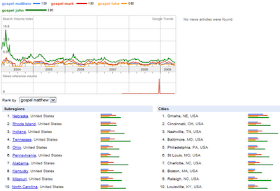 Okay, now that my title got your attention, it's an excuse to point out another Google Labs tool called Google Trends. It allows you to compare up to five terms, and it returns results showing relative frequency in search requests and news articles. Results can be further refined by date and (sub)regions. So, I tried comparing: jesus, beatles, "michael jackson".
Okay, now that my title got your attention, it's an excuse to point out another Google Labs tool called Google Trends. It allows you to compare up to five terms, and it returns results showing relative frequency in search requests and news articles. Results can be further refined by date and (sub)regions. So, I tried comparing: jesus, beatles, "michael jackson". As the chart shows (clicking on the chart will bring you to the actual results), Jesus has always been bigger than the Beatles! Michael Jackson (during his trial in 2005 and now with his death reflected in the sharp spike at the latest date) has occasionally outdone Jesus.

As with all statistics, results may not be entirely meaningful and can be easily manipulated. (E.g., in my search above, it doesn't distinguish between Jesus Christ and any person named Jesus.) I was trying to think of some other meaningful searches, however. How about: "old testament" apocrypha "new testament"
 As you would expect, the Apocrypha greatly trails either of the Testaments, but perhaps you might not have predicted that the OT and NT would in fact be so close in 'popularity'. Also note in this example that the most popular references are highlighted in news articles. Clicking on the "More news results" option will bring you to the News Archives Timeline where you can refine time periods for your search.
As you would expect, the Apocrypha greatly trails either of the Testaments, but perhaps you might not have predicted that the OT and NT would in fact be so close in 'popularity'. Also note in this example that the most popular references are highlighted in news articles. Clicking on the "More news results" option will bring you to the News Archives Timeline where you can refine time periods for your search. One more example I searched for is: "gospel matthew" "gospel mark" "gospel luke" "gospel john" (Note that I had to do it this way, because if I just did "matthew, mark, luke, john," all the references to John McCain and the presidential elections dwarfed everything else.) Now before looking at the chart, do you have a guess about which Gospel is most popular? (And in this case, I focused my results on just the United States.)
 As one might have expected, John is the most 'popular' Gospel. I had thought that I might see some changes in interest related to the changes in focus based on the lectionary cycle, but the results are minimal. Do note in this example the additional data about results related to regions. Nebraska and Rhode Island (go figure?!) were the top spots searching for the Gospels. The relative popularity between the Gospels is also distinctive with Tennessee, Alabama, and North Carolina showing a distinct preference for John. Rhode Island showed the most balance.
As one might have expected, John is the most 'popular' Gospel. I had thought that I might see some changes in interest related to the changes in focus based on the lectionary cycle, but the results are minimal. Do note in this example the additional data about results related to regions. Nebraska and Rhode Island (go figure?!) were the top spots searching for the Gospels. The relative popularity between the Gospels is also distinctive with Tennessee, Alabama, and North Carolina showing a distinct preference for John. Rhode Island showed the most balance. The data can also be exported into a CSV file for further inspection/manipulation in Excel.
In any case, I'm not exactly sure how to make good use of this research tool, but it is interesting. If you come up with something significant, please share it here.

Very glad to see the OT is .02 ahead of the NT! However, considering that the OT is three times the size, it is definitely coming up short.
ReplyDelete"Not sure how to make use of this tool"? Well, try Google Trends big brother, Google Insights for Search. You can find exactly what people are searching for, when, where, etc. This lets you target your website better. If people look for Hebrew Bible resources in the US, or Israel, or elsewhere, for example? Do people type in LXX or Septuagint for the search? You can find all that out in Google Insights For Search and target your web pages accordingly. Do people prefer to search for Tanakh, or Hebrew Bible?
ReplyDelete